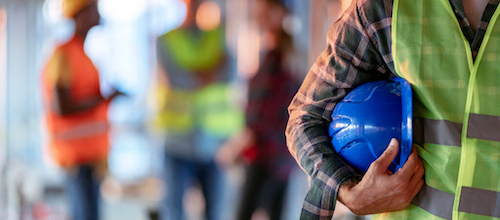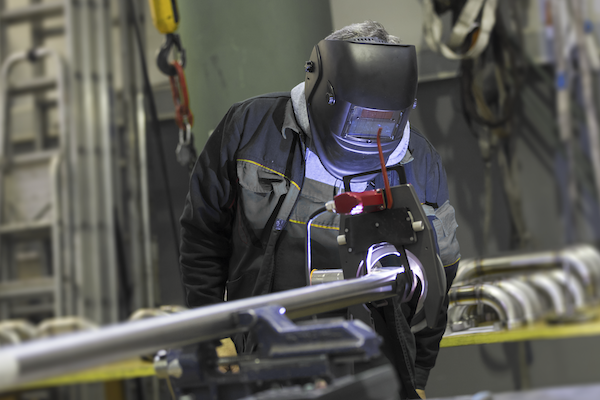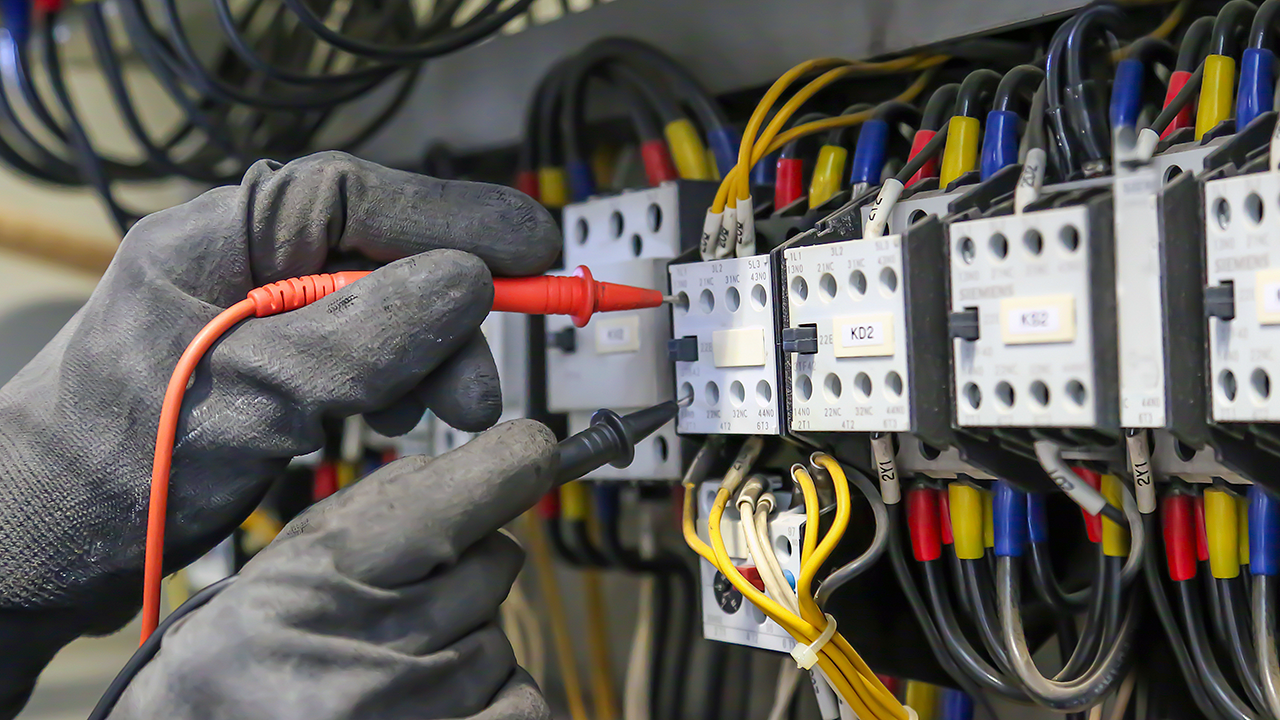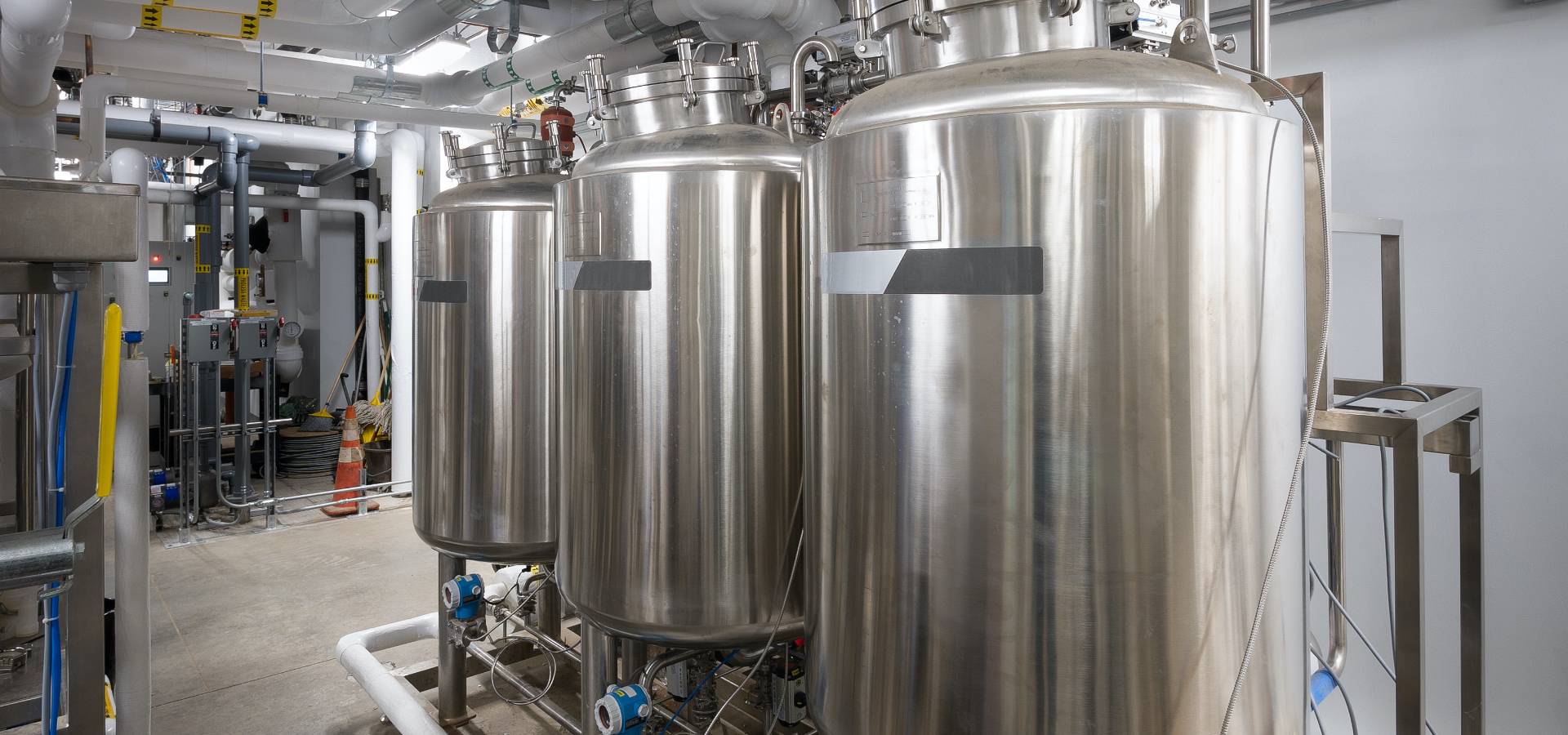
Faster, better, safer. Those three words sum up the process of modular construction for design-build mechanical and plumbing contractors like Binsky. Plus, they add up to significant client savings, too.
Modularization, quite simply, refers to something that is designed or produced in separate sections in order to combine as a whole and create the desired end goal. Therefore, modular construction relies heavily on the prefabrication of different parts and pieces, or modules, to be delivered onto a job site to complete the overall building installation.
Binksy’s Project Executive Bob Durr who oversees the company’s manufacturing facilities explains it like this, “Prefab is when the field looks to see how much work can be done in the shop that’s practical. We’ll weld an elbow to a length of pipe or make some Ts and a branch—something that will fit on the back of a truck pretty easily.”
By going a step further to get everything on a skid, we enter into the realm of advanced fabrication or modularization. “If you have a series of hot water boilers and expansion tanks, for example, you make a skid and mount them all in the shop—in a controlled environment, a safe environment,” mentions Durr. “There are no weather conditions to deal with or job site issues you usually run into. The skid is sent out as one piece to the field, so the field is putting in four anchor bolts or so to mount it, as opposed to stick building it in the field,” he continues.
The ultimate type of modularization occurs once coordination with other trades comes into play, garnering results like multi-trade racks. “Control panels with all the equipment pre-wired, racks of piping going out with ductwork and electrical on it, bathroom pods that are already pre-made—that’s the ultimate. And at Binsky, we’ll cooperate with any partner necessary to make that happen,” suggests Durr.
#1: Faster Project Delivery
Through advanced fabrication and modular construction capabilities, Binsky can accelerate speed to market by meeting milestones on, or even ahead, of the overall project schedule. With two fully equipped fabrication shops, state-of-the-art technology, and a dedicated team of mechanical and civil engineers, Binsky is equipped to prefabricate pipe racks, multi-trade racks, equipment skids, sheet metal, plumbing fixtures, and more.
Durr states, “Our project managers are now looking at each job from a much more critical angle as they try to set up prefab or hanger installation packages from the beginning with modules and determine how some of the project’s needs can be met in a modular way.”
Within the indoor environment of a fabrication shop, installation experts can continue to meet project goals regardless of the weather, or work being executed by other trades.
#2: Better Quality Assurance
Another benefit of a controlled working environment is consistent quality assurance. While Binsky always strives to deliver work of the highest caliber, the in-depth planning that goes into prefabrication and modularization efforts ensures the work is done right the first time.
Binsky’s team of design experts uses cutting-edge technology to produce layouts that help determine modularization viability and capitalize on fabrication opportunities. Through software like Autodesk
Revit and virtual reality, our engineers can send fabrication releases to the shops for construction, making for a more collaborative design phase.
In fact, the assistance of virtual models has become so pivotal in the development of Binsky’s offsite prefabrication efforts that it’s led to the creation of Binsky DFX Live, a software program that can obtain the information found in the virtual model.
#3: Safer Working Environments
Working within a controlled environment, like a Binksy fabrication shop, allows for the safer execution of project work, too. Many of the harms and hazards associated with a traditional job site are eliminated with prefabrication or modularization within a fabrication shop.
From production to installation and site work, traditional safety hazards decrease significantly when fabrication occurs offsite. Modular construction, on average, decreases onsite labor by 30 to 50 percent. Fewer contractors working in parallel with one another, fewer laborers on-site, and fewer deliveries all help to reduce site disruption as well as major risks like falls, which account for nearly 33 percent of job site fatalities.
In addition, offsite modularization also helps Binsky’s hygienics division meet the stringent requirements of certain projects involving FDA-validated systems, such as those in the food and pharmaceutical industries.
#4: Cost Savings for Owners
Ultimately, a faster, better, safer job executed with prefabrication and modularization techniques results in cost savings for owners. When owners can rest assured that they will receive exactly what they want when they want it through these processes, it makes one wonder how construction projects were ever executed any other way.
“Recently, we started offering this as a service to clients because of the huge benefit they stand to receive,” mentions Durr. “The benefit for the client is a lower-priced project in the long-run, better quality, and at a faster pace due to less coordination issues in the field.”
“Right now, there are about three or four hospitals we’re doing and some pharmaceutical facilities. The two big ones are Valley Hospital and Hackensack Hospital—both of which involve prefab racks,” state Durr.
“We’re doing as much prefab as we can on our current jobs. We’re doing a lot of rack piping. We try to do everything on these prefabricated racks, send them out with all the different systems—refrigerant systems, hot water, cold water, domestic water, anything you’d usually find. In hospitals, there’s also medical gas. And we’re doing one design-assist project in Pennsylvania that’s requiring a process system for making dog food.”
From hospitals to bio-life sciences to manufacturing, there does not seem to be an industry that cannot benefit from modular construction techniques. As contractors like Binsky continue to pave this path of innovation, everyone involved stands to benefit.
Subscribe to stay updated
Get the latest updates in the world of mechanical contracting and construction. Subscribe today!
Ready to Start Your Project?
Turn to a trusted leader in mechanical construction. Get in touch to discuss your project or request a quote today.




